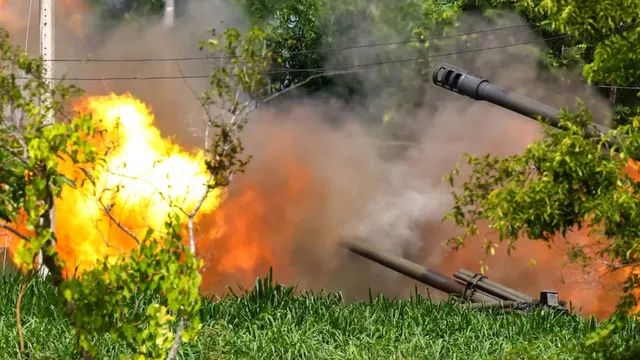- By Supratik Das
- Sat, 26 Jul 2025 11:32 AM (IST)
- Source:JND
Thailand-Cambodia border clash updates: Following fatal clashes across the border between Thailand and Cambodia, India's Embassy in both countries issued travel advisories, warning Indian nationals against traveling to war-torn regions. The rising military tension has already taken more than 20 lives and displaced more than 130,000 citizens in what has become the worst confrontation between the two Southeast Asian neighbors in more than a decade. The Embassy of India in Phnom Penh issued an official advisory yesterday on Saturday, that said, "In view of the current clashes along the Cambodia-Thailand border, Indian nationals are requested not to travel to the border regions." In case of an emergency, Indian citizens living in Cambodia have been asked to call the Embassy at +855 92881676 or email at cons.phnompenh@mea.gov.in.
— India in Cambodia (@indembcam) July 26, 2025
A similar warning was issued a day earlier by the Indian Embassy in Thailand, which specifically urged Indian travellers to avoid visiting seven eastern provinces that border Cambodia. These include Ubon Ratchathani, Surin, Sisaket, Buriram, Sa Kaeo, Chanthaburi, and Trat, areas now witnessing intense military engagements.
Ancient Temples Spark Fresh Violence
At the center of the crisis are longstanding territorial disputes linked to historic sites, including the 11th-century Preah Vihear Temple and Ta Muen Thom Temple, revered structures straddling the contentious 817-km border. Although the ICJ declared in 1962 that Preah Vihear is part of Cambodia, and again in 2013 reaffirmed that judgment, Thailand maintains its claim to some lands surrounding the site. Now the latest escalation into its shelling brings drone overflights, air raids, and heavy artillery barrages to these culturally important areas. Cambodia accused Thai fighter planes of attacking sites close to Preah Vihear, a UNESCO World Heritage site, and has termed the airstrikes as a violation of international law. Thailand has refused to accept these allegations and stands firm on its military operations being acts of self-defence.
Both nations responded to the escalation by filing formal complaints to the United Nations Security Council (UNSC). In an emergency meeting on Saturday, Cambodia advocated for an "immediate, unconditional ceasefire." Cambodia's UN Ambassador Chhea Keo highlighted the demand for peaceful talks, while Thailand signaled its willingness to regional talks by embracing Malaysia's efforts at mediation under the ASEAN umbrella.
The violence escalated at the beginning of this week when five Thai soldiers were injured by a landmine explosion that triggered a cycle of tit-for-tat attacks. Thailand blames Cambodia for planting new Russian-made mines, a charge Phnom Penh denies, blaming the explosion on leftover unexploded ordnance from previous wars. Thailand retaliated with F-16 fighter planes bombing Cambodian army outposts. Cambodia, without similar airpower, characterized the aerial attacks as unreasonable, military acts of aggression.
ALSO READ: Cambodia Calls For Unconditional Ceasefire Amid Fierce Border Fighting With Thailand
Civilian Toll and Humanitarian Crisis
According to Thailand’s Public Health Ministry, 19 Thai nationals have been confirmed dead, 13 civilians and six soldiers, with at least 62 others injured. Cambodian officials confirmed one civilian fatality and five injuries in Oddar Meanchey province, though unofficial sources suggest the numbers are significantly higher. It reported the employment of BM-21 rocket launchers, heavy artillery, and cluster bombs, a tactic Cambodia accuses of breaching international norms. Thailand, which is not a signatory to the Convention on Cluster Munitions, justified its tactics as proportionate and limited to military objectives.
Meanwhile, Thailand has evacuated more than 138,000 people from its northeastern provinces. Cambodia has relocated nearly 12,000 families, with temporary shelters set up in both nations. Field hospitals, food aid, and emergency supplies have been deployed, but relief efforts are strained under the growing humanitarian toll.
ALSO READ: Indian Embassy In Thailand Issues Travel Advisory As Thailand-Cambodia Border Clashes Leave 14 Dead
The clash has sparked a diplomatic impasse, as both nations expelled ambassadors from each other. Cambodian Prime Minister Hun Manet blamed Thailand for reneging on a ceasefire proposal proposed by Malaysian Prime Minister Anwar Ibrahim, hours after allegedly agreeing to the offer. India's Embassy in Thailand renewed its travel advisory in urging Indians to stay on their guard, monitor local media, and steer clear of the troubled areas. Travelers are encouraged to refer to official postings from the Tourism Authority of Thailand (TAT) Newsroom and abide by all safety measures as directed by Thai authorities. "In light of the development along the Thai-Cambodian border, all Indian travelers to Thailand are urged to refer to updates on Thai official websites, such as the TAT Newsroom. According to the Tourism Authority of Thailand, the following destinations are not advised for travel," the Embassy stated

